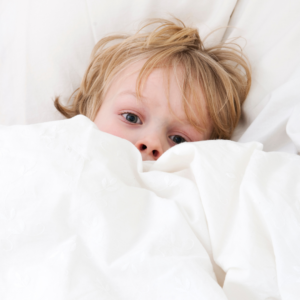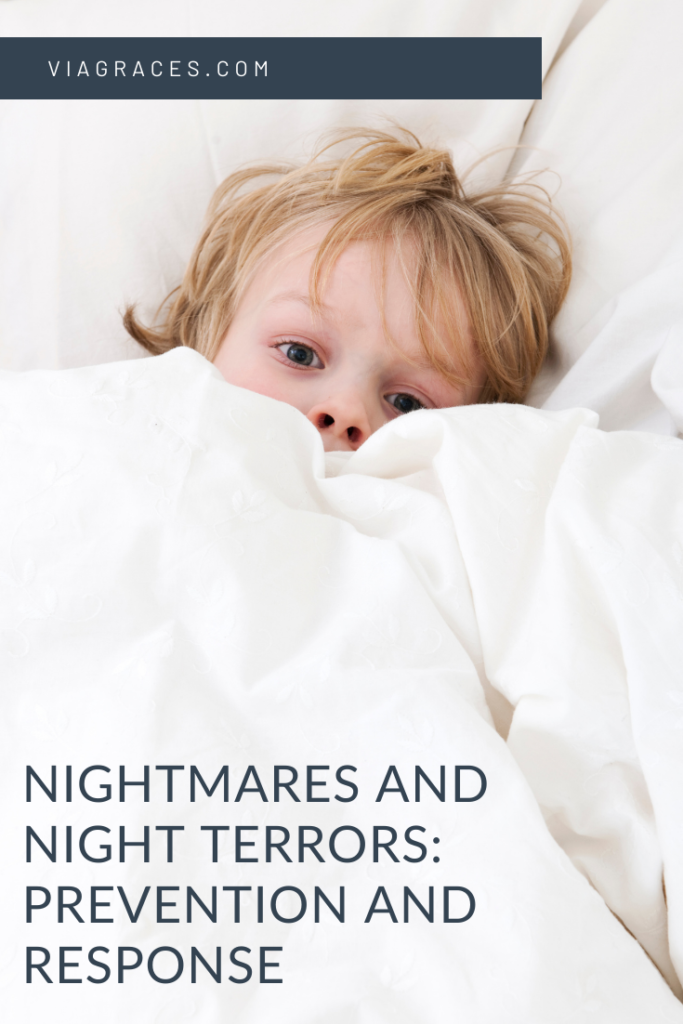I have a scenario for you…
Everyone in your house is sound asleep and out of nowhere you hear your little one screaming. What is going on? Are they having a nightmare? Is it a night terror?
What do you do?? And how do you keep it from happening again?
I thankfully haven’t experienced a night terror as a mom, but I have as a babysitter, and I had no clue what was going on. I was watching a friend’s kiddos and it honestly terrified me!
And my girls have never woken us up due to a nightmare, but our older two have mentioned a few nightmares they’ve had and they obviously don’t like them. And we’ve talked through what to do when it happens.
And I certainly had nightmares as a child and I get them occasionally as an adult!
Bottom line, they’re not fun. So let’s talk about them. In this post, I’m going to share:
- The difference between nightmares and night terrors
- How to prevent nightmares and night terrors
- How to help your child fall back sleep after a nightmare
- How to support your child through a night terror
And more!
How are nightmares and night terrors different?
Nightmares
Nightmares are a bad dream, and they are a normal part of a child’s development. Children around the age of two and three (or older) may start experiencing nightmares, as this is when their imaginations start to run wild. For younger kiddos, however, they still have a difficult time distinguishing between what’s real and make-believe, which can make those nightmares extra scary.
You will know your child has had a nightmare (as opposed to a night terror) because they may wake up crying, they might seek your comfort, and they will recognize you when you come into the room.
And your child will know they had a nightmare, which might make it take longer to fall back asleep because those scary thoughts are fresh in their mind. Plus they’ve already gotten a good chunk of sleep, so while they still need a lot more, that sleep pressure has been impacted!
Nightmares also usually happen later in the night/early in the morning – so you’ll very likely be sleeping when your little one has a nightmare.

Night terrors, on the other hand, are different.
Night Terrors
You will know your child is having a night terror because when you respond to their screams or shouts, they likely won’t respond to you in the room. Your touch and voice won’t seem to make any changes to what’s happening.
Their eyes will likely still be shut, and if they’re talking, it will likely be incoherent or just won’t make much sense to you.
Once they snap out of it, they likely won’t be able to tell you what was happening, and they may even go right back to sleep. And your child won’t remember it the next day.
Unlike nightmares, night terrors generally happen in the first few hours of the night, often before parents even go to bed.
Finally, I think it’s important to note that night terrors can be genetic. So if someone in your family had a lot of night terrors growing up, there’s a chance that’s why your child is experiencing them, as well.
How can we prevent nightmares and night terrors?
Although we can’t control if and when our child has a nightmare or night terror, there are some measures we can take to help prevent them:
- Make sure your child is not consistently overtired! Overtiredness and sleep debt are often connected to nightmares and night terrors.
- Cut out any kind of screen time at least one hour before bed, though two hours is ideal. A good rule of thumb is once it’s dinner time, screens are off for the night!
- Try to avoid scary videos, books, and games, especially before bed, but during the day, too! It’s still entering your child’s imagination and could come out at night.
- Make sure your child is not too hot overnight. If they tend to run warmer, consider short sleeve jammies and run a fan in their room through the night so they stay cool.
- Avoid high doses of vitamins at bedtime. If you give your child vitamins, aim for morning/earlier in the day!
- If your child is on any medications, check with their pediatrician to make sure the medications are not interfering with their nighttime sleep.
- I would say this is not common, but still worth mentioning…For some young kids, having a full bladder and night terrors are connected. I know parents who have taken their kiddo to the bathroom once the night terror is over and they seemed to really need to pee! So if you think that might be the case with your kiddo, consider adding an extra potty stop to your child’s bedtime routine to empty that bladder as much as possible. And also try to limit liquids after dinner, and again, consider offering a bathroom break before they go back to sleep after their night terror is over.
How should we respond to a nightmare?
Absolutely respond when you think your child has had a nightmare by going right to their room. If they run into your room, walk them back to their room and try to comfort them from there. Perfect world, you can resettle them back in their bed and soon you’ll be back in your bed.
Remember to reassure your child that they are safe, they are at home, in their cozy room with their favorite lovey. Maybe rub their back and sing the bedtime song.
I don’t recommend asking about the dream! Your child may say they had a bad dream, but unless they start rolling through the details of it, don’t ask about it! We don’t need them retelling and thinking even more about what freaked them out in the first place.
On the independent sleep side, the end goal is that they fall back asleep and you head back to your bed. So try not to linger in their room for too long and try to keep your child in their bed once you’re in their room.
If you leaving seems to be bringing up some anxiety, say something like, “I’m going to go get a drink of water. Stay in bed and I’ll come check on you when I’m done.” Or, “I have to go to the bathroom. Lay down quietly and I’ll be back to check on you when I’m done.”
These little check-ins could give your child the reassurance they need to feel comfortable falling back asleep, even without you in there.
But what happens if your child has a nightmare and just can’t seem to fall back asleep on their own?
Stay in there! An off night of helping your little one to sleep is not going to throw their sleep out the window. So if they’ve woken up afraid of something, comfort them! And if you have to stay in there extra long, or you end up sleeping with them or pulling them into bed with you for the rest of the night, so be it!
It’s one off night, and everything is fine. Approach the next night as you normally would, and it should be a normal night!
And then thinking long-term…we want to be equipping our kids to deal with so many things in life, and scary dreams are one of those! So chat about what to do if they have a bad dream – but do so during the day, because again, we don’t need those bad dreams front of mind as you’re tucking them in at night!
Although our girls have never woken up crying or called out for us due to a nightmare, they have told us the next morning when they’ve had bad dreams.
I often wish they would come get us if they’ve had a nightmare because I would love to help them, AND I know they’re figuring out the tools they need to fall back asleep. The times that they do tell us about their nightmares, we not only remind them they are always welcome to come get us, but we also remind them what they can do if they have a scary dream.
And in that conversation, I always share with them what I do when I have a scary dream! Which I think is even just helpful to know grownups can have nightmares too.
So sometimes I get out of bed and go to the bathroom just to wake up a bit more in hopes of not falling back asleep into the same dream. Sometimes I pray, and when I don’t know what to pray I just say, “Jesus Jesus Jesus Jesus Jesus.” And I remind our kids of the song that goes along with a Bible verse that says, “When I am afraid, I will trust in you.”
I tell them sometimes I even roll over and cuddle daddy! And I tell them they can do the same with their lovey or a pillow. We might practice deep breaths so they can use that as another strategy if they’re scared.
The goal here isn’t to deter them from coming to us, but the goal here is to give them little tools for their tool belt.
As they continue to get older, we want our kids to know how to get back to sleep when they’re having a tough time, just like you and I can!
How should we respond to a night terror?
Just like with a nightmare, absolutely respond when your child is having a night terror. This response, however, will look different, as your child will not be aware that you’re there.
First of all, do not try to wake up your child, as this could cause more panic and confusion all around. You can try to rub their back, shush them, sing to them, but nothing will really help until the night terror is over – you really just have to ride it out.
If your child is getting up and trying to move around, do your best to keep them in bed/in their room to minimize the risk of getting hurt.
Once the night terror is over, help your child back in bed and tuck them in. They will likely drift right back to sleep and might not know you’re in there!
If, for whatever reason, your little one does wake up after the night terror is over, give them some reassurance, just like we talked about with nightmares, and then remember the goal is to be able to leave again for them to fall back asleep independently.
Conclusion
While nightmares and night terrors can be scary experiences for both adults and kids, I want to help you know the difference between the two so you can cater your response to your child accordingly. I also want you to know what sometimes causes nightmares and night terrors, as there’s a chance you can prevent some!
Also remember that you can’t prevent every nightmare and night terror. And you may end up just snuggling your kiddo for the rest of the night, or pulling them into bed with you – and that may be because they just need you, or because your mama heart is just sad and you want to stay with them.
And that’s okay! One off night is not going to ruin your little one’s sleep, so there’s nothing wrong with that extra comfort.
With Grace,
Lauren
